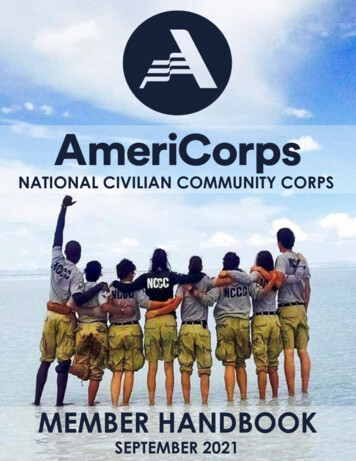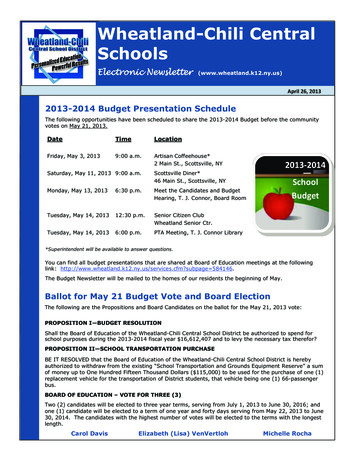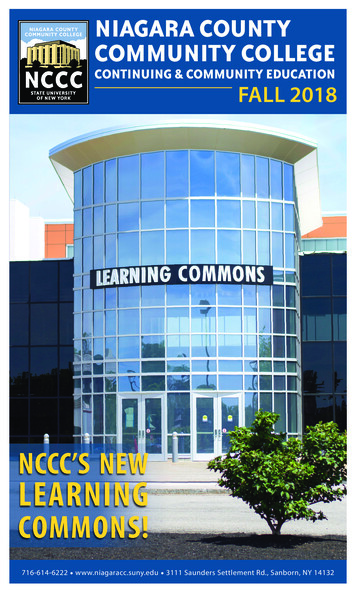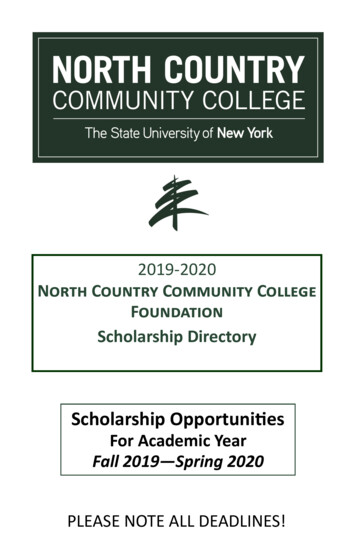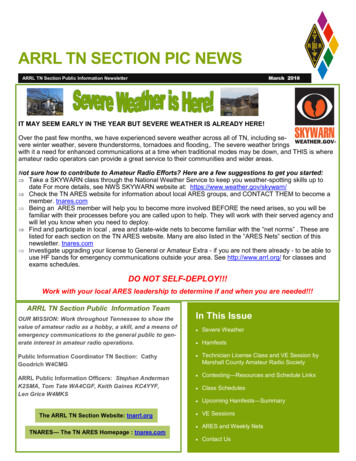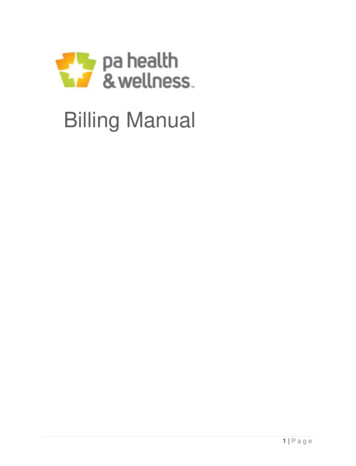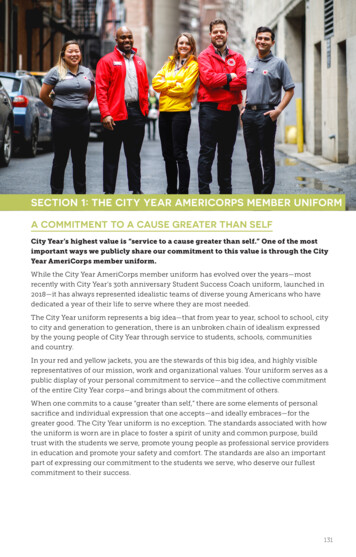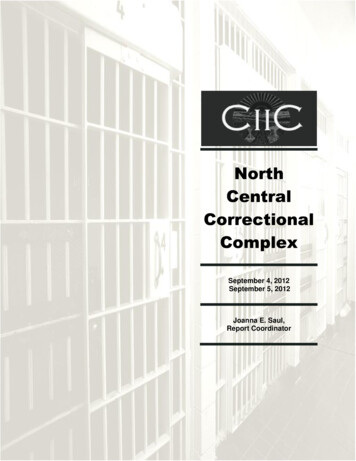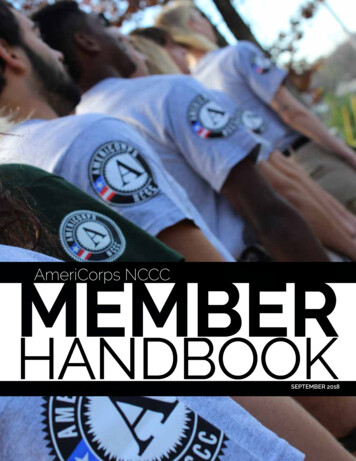
Transcription
AmeriCorps NCCCMEMBERHANDBOOKSEPTEMBER 2018
SEPTEMBER 2018AmeriCorps NCCCCorporation for National and Community Service250 E St SW, Suite 300Washington, DC 20525www.nationalservice.govUpon request, this material will be made available in alternative formats for people with disabilities.
CONTENTSOverview of CNCS3AmeriCorps NCCC PoliciesRights and Responsibilities . . . . . . .Code of Conduct and Professional Behavior.Disciplinary Standards . . . . . . . . .Sexual Harassment. . . . . . . . . . .Drugs, Alcohol, and Tobacco . . . . . . .Uniform and Grooming Standards . . . . .Social Media Policy . . . . . . . . . . .Telecommunications . . . . . . . . . .710121720222324Living Allowance . . . . . . . . . . . . . . . . . . . .Health Benefits and the Federal Employees Compensation Act .Education Award . . . . . . . . . . . . . . . . . . . .Child Care Benefits . . . . . . . . . . . . . . . . . . .Emergency Leave and Personal Absences . . . . . . . . .Travel to and from Campus . . . . . . . . . . . . . . .252527313132BenefitsLifeResidential Living . . . . . .Inspections . . . . . . . . .Privately Owned Vehicles (POV) .Use of Government Vehicles . .Use of Sponsor Vehicles. . . .3537383941.4345454647Service Hours Policy . . . . . . . . . .Service Learning and Member DevelopmentMember Grievance Procedures . . . . . .Physical and Mental Health . . . . . . .Member Liability for Government Property .Federal Tort Claims Act . . . . . . . . .495051535555Welfare of MembersSafety . . . . . .Hazardous MaterialsPhysical Training . .Inclement Weather .Spike Sites . . . .AdministrationGlossary of Terms56AmeriCorps NCCC 1
AmeriCorps NCCC 2
THE CORPORATION FOR NATIONALAND COMMUNITY SERVICE (CNCS)OVERVIEW OF CNCSCNCS provides opportunities for Americans of all agesand backgrounds to serve their communities and countrythrough two programs: Senior Corps and AmeriCorps.Working with national and community nonprofits, faithbased groups, schools, and local agencies, CNCS engagesmore than 5 million Americans each year in meeting criticalneeds in education, the environment, public safety, disasterservices, and other areas.AmeriCorps engages thousands of Americans each year inintensive service to meet community needs in education,the environment, disaster services, and other areas. SeniorCorps taps the skills, talents, and experience of more thanhalf a million Americans age 55 and older to meet a widerange of community needs. The Volunteer Generation Fundand Nonprofit Capacity Building Program are all designedto increase the capacity and scale of impact for granteeorganizations.CNCS is working to foster a culture of citizenship, service,and responsibility in America and to help all Americansanswer the President’s call to service.OVERVIEW OF AMERICORPSThere are three branches of AmeriCorps: AmeriCorps State and National, a federal grantprogram through which Members serve withnational nonprofit organizations like Habitat forHumanity, the American Red Cross, and Teachfor America, as well as with hundreds of smallercommunity organizations, both secular and faithbased; AmeriCorps NCCC, a team-based residentialprogram for adults age 18-24, who serve out of oneof four regional campuses located in Vicksburg, MS;Aurora, CO; Sacramento, CA; and Vinton, IA., andserve full-time for approximately 10 months, livingand serving together as a team; and AmeriCorps VISTA, a program focused on fightingpoverty.In exchange for a successful year of service, AmeriCorpsMembers earn a modest living allowance and an educationaward, equal in value to the Federal Pell Grant, which canbe used to pay for college or to pay back qualified studentloans.OVERVIEW OF AmeriCorps NCCCAmeriCorps NCCC (National Civilian Community Corps) is afull-time residential program open to U.S. citizens, nationals,and lawful permanent residents between the ages of 18 and24, with no upper age limit for Team Leaders. AmeriCorpsNCCC combines the best practices of civilian service withthe best aspects of military service, including leadershipdevelopment and team building. Because Members aretrained in disaster services and can be assigned to newduties on short notice, they are particularly well-suited tomeet the nation’s disaster service needs.During their service, Members receive lodging, meals,uniforms, health benefits, child care benefits, loanforbearance, and a modest living allowance. All Membersreceive training in leadership, team building, disasterservices, and civic engagement; a small group of Membersmay also receive wildland firefighting training, and all TeamLeaders will receive CPR/First Aid certification.Program Description:AmeriCorps NCCC Members work in teams of approximately10 Members on projects related to: natural and otherdisasters, infrastructure improvement, environmentalstewardship and conservation, energy conservation, andurban and rural development. These AmeriCorps NCCCteams complete projects that typically last from six to 12weeks, infusing essential human resources and servingpeople in every state. Approximately 85 percent of projectsrequire teams to live and serve in communities away fromthe AmeriCorps NCCC campus. AmeriCorps NCCC’s flexibleprogram structure allows both the opportunity to partnerwith non-profit or government organizations, and the abilityto create strategic collaborations with other national serviceprograms and federal agencies to magnify the impact oncommunities served.AmeriCorps NCCC 3
Typical AmeriCorps NCCC Service ActivitiesTypical AmeriCorps NCCC service activities include: leading youth development activities; constructing and rehabilitating low-income housing; trail building and environmental restoration; helping communities develop emergency plans; and addressing other pressing local needs.Project sponsors include national, community, and faithbased nonprofit organizations; municipal and stategovernments; federal agencies; parks; and schools. Nationalpartners include the American Red Cross, Habitat forHumanity, and the U.S. Forest Service.FEMA CorpsIn 2012, AmeriCorps NCCC collaborated with the FederalEmergency Management Agency (FEMA) and created a newAmeriCorps NCCC service track called the NCCC-FEMA Corps.FEMA Corps Members are solely devoted to disasterpreparedness, mitigation, response, and recovery, andpromote an ethic of national service, strengthens thefederal government’s disaster capabilities, and expandseducational and economic opportunities for young people.The partnership adds up to an additional 1,000 Membersannually within AmeriCorps NCCC. FEMA Corps Membersmust be U.S. Citizens between the ages of 18-24, with noupper age limit for Team Leaders.AmeriCorps NCCC 4Program Description:FEMA Corps Members engage in a variety of disaster workincluding supporting disaster services facilities, respondingto helpline calls, and disseminating disaster preparednessand mitigation information to the public. FEMA Corpstraining and experience prepares Members for careers inemergency management and related fields. Members learnabout community organizing, public speaking, customerservice, and office management skills while positivelyimpacting the lives of disaster victims.Typical FEMA Corps Service ActivitiesTypical FEMA Corps service activities include: helping survivors complete applications for disasterassistance; educating communities, assessing needs, andcollecting information; developing promotional public disasterpreparedness materials; ordering materials, tracking inventory, loadingsupplies, and managing IT equipment; updating electronic files, managing data, andcompiling reports; coordinating disaster survivor services bypartnering with nonprofits and governmentagencies; assessing and reporting damage to public facilities; setting up shelter operations and re-unification offamilies and pets.
Team LeadersTeam Leaders, under the leadership and guidance of theUnit Leader (or Unit Department), are responsible for thegeneral safety, well-being, performance, and personaldevelopment of their Corps Members on their campus oforigin. Team Leaders will: maintain team order, develop team morale, fosterteam work, ensure safety, and monitor and reporton the standards of performance and behavior ofthe team; assist and support team personal, professionaland leadership development through regularassessments; conduct regular team meetings to provide feedbackon service projects; manage all administrative, financial, reporting andpersonal matters for the team, to include issuesrelated to illness and family emergencies; meet the Core Expectations for Corps Members andTeam Leaders; supervise, motivate and direct teams; act as liaison between the Corps Member and UnitLeader (or Unit Department); support adherence to, and ensure team compliancewith, all AmeriCorps NCCC policies and procedures; represent AmeriCorps NCCC to the media asappropriate; supervise team housing, meals and other activities; support residential life experience for teamsthrough conflict mediation, crisis intervention andcounseling;supervise Members during project rounds andtransitions; and coordinate deployment logistics with campus UnitLeaders.AmeriCorps NCCC 5
AmeriCorps NCCC 6
AMERICORPS NCCC POLICIESTo enter AmeriCorps NCCC is to become a member ofa community. Choosing to become a member of thiscommunity implies a commitment to maintaining anenvironment in which both community and individual goalscan be attained. Acceptance as a member of this communityis a privilege; sharing in the maintenance of this communityis a responsibility. As such, all Members are expected toabide by the AmeriCorps NCCC Code of Conduct.AmeriCorps NCCC is committed to maintaining anenvironment in which diversity is accepted and celebrated.It is celebrated because each individual contributes awealth of values and experiences to the work and serviceenvironment: age, race, gender, ethnicity, physical ability,education, religion, marital status, socio-economic status,political ideology, and more.As we welcome and cherish these differences, and as werespect and learn from these differences, we enhanceour productivity and overall quality of life and recognizethat all people are as one. Therefore, each member ofthe AmeriCorps NCCC community is expected to treat allindividuals with a common standard of decency.ABOUT THIS HANDBOOKThe policies in this handbook apply to all participants inthe AmeriCorps NCCC program. As used in this handbook,the term “Member” means “Members and Team Leaders,”unless the context otherwise requires.RIGHTS AND RESPONSIBILITIESA. Basic RightsAll Members have the right to: serve, work, and learn in an atmosphere free fromdisrespect, harassment, and discrimination of anyindividual or group of individuals. CNCS prohibitsall forms of discrimination based upon race, color,national origin, sex, age, religion, sexual orientation,disability, gender identity or expression, maritalor parental status, military service, or politicalaffiliation; be recognized and treated as responsible andcapable adults who are willing and able to acceptresponsibility, both individually and as teamMembers; provide input to campus management concerningcampus issues; have grievances and complaints heard andanswered in a consistent and timely manner; have reason(s) for transfers, terminations, andother significant actions clearly stated in writing;and appeal inter-campus transfers and dismissaldecisions to the National Director of AmeriCorpsNCCC.B. Voting, Electoral, and Lobbying Activities1. Local or Absentee VotingCampuses will facilitate AmeriCorps NCCC Members’ abilityto vote, either locally or by absentee ballot.2. Voting ProceduresCampuses will provide assistance on voting procedures,including assisting eligible voters to request absenteeballots, arranging for absentee ballots to be marked inprivate, and arranging transportation within a reasonabledistance (in the local area) from the campus to polls whennecessary. CNCS Employees are subject to the Hatch Act,and are not permitted to engage in partisan political activity.3. Political ActivitiesIndividuals may engage in political activities while off duty.They may actively campaign for or against candidatesin partisan elections, participate in political rallies andmeetings, and hold office in political clubs or parties.Members are prohibited from engaging in political activitieswhile wearing the AmeriCorps NCCC uniform (or anypart that identifies the Member as an AmeriCorps NCCCMember). Members may not use government vehiclesfor the purpose of engaging in or travelling to or from anypartisan political activity, event, or political rally.AmeriCorps NCCC 7
4. Prohibited ActivitiesIndividuals may not use their authority to coerce, attemptto direct, or advise another Member to pay, lend, orcontribute anything of value to anyone for political purposes.No Member may display posters, stickers, buttons, etc.,that have a partisan theme while serving, regardless oflocation, or while wearing the AmeriCorps NCCC uniform.Individuals may not represent themselves as speaking orwriting on behalf of AmeriCorps NCCC, AmeriCorps, or CNCS.Individuals may not participate in partisan political activityas part of their service or duties, or when such activitieswould be perceived as part of their duties.positive for HIV or have a mental disability that is controlledby medication. However, AmeriCorps NCCC may denyparticipation to an individual who has an active, contagiousdisease that constitutes a direct threat to the individual or toothers.Reasonable accommodation may include, but is not limitedto: assignment to a campus that is accessible to anotherwise qualified individual; making designated facilities readily accessible to,and usable by, individuals with disabilities;C. Rights Relative to Religion acquiring or modifying equipment or devices, orproviding readers or interpreters; and1. Opportunity to Worship other similar actions that do not impose an unduefinancial or administrative burden on AmeriCorpsNCCC or that would fundamentally alter theprogram.AmeriCorps NCCC Members will be provided the opportunityto worship (or not to worship) as they choose. Everyreasonable effort will be made to provide access to religiousservices for Members serving in remote locations, includingAmeriCorps NCCC campuses where public transportation isnot readily available.Any requests for religious accommodation should besubmitted to the Region Director.2. Religious ActivitiesIndividuals will not give religious instruction, conductworship services, or engage in any other religious activity aspart of their service or duties, or when such activities wouldbe perceived as part of their service or duties. This does notpreclude Members from engaging in religious activities (e.g.,Bible studies) in the dormitories or other AmeriCorps NCCCbuildings during non-service hours.No religious instruction, worship, proselytization, or otherreligious activity will be conducted as part of a projectto which individuals are assigned. If Members choose toparticipate in a sponsor-led religious activity (e.g. startingthe day with a prayer), Members may wear the AmeriCorpsNCCC uniform.D. Right to Reasonable Accommodation(Physical/Mental Disabilities)AmeriCorps NCCC will not deny the benefits of its activitiesor services to qualified applicants with disabilities and willmake reasonable accommodation for the known physicalor mental limitations of an otherwise qualified Member. Inthis regard, AmeriCorps NCCC will not deny participationin AmeriCorps NCCC to applicants who, for example, testAmeriCorps NCCC 8Individuals are responsible for identifying their specificaccommodation need(s). AmeriCorps NCCC will not imposean accommodation on any Member. The Member must: identify himself or herself and his or her needs tothe Region Director through the Team Leader, UnitLeader, and/or Deputy Region Director for UnitLeadership; work with appropriate staff to specify, arrange, andfollow through on accommodations; and alert the Team Leader and Unit Leader immediatelyto problems he or she encounters that AmeriCorpsNCCC can help resolve.The National Director will make the final decision onaccommodation, in consultation with appropriate CNCSoffices.
E. Right to Privacy First aid and any relevant safety personnel maybe informed, when appropriate, if the medicalcondition (or illness/injury) could affect emergencytreatment; Government officials investigating compliance withthe Rehabilitation Act shall be provided relevantinformation upon request; or In addition, some other laws and requirementsauthorize disclosure. For example, state and federalpublic health requirements include reportingrecently diagnosed cases of certain contagiousdiseases, and the AmeriCorps NCCC health benefitsplan may require medical information in order toresolve issues concerning pre-existing conditions.1 Member RecordsThe Privacy Act (5 U.S.C.§552a), and CNCS’s implementingregulations at 45 C.F.R. Part 2508, gives citizens theright of privacy regarding records maintained on thempersonally by AmeriCorps NCCC and/or CNCS. It also givesthem appropriate access to their own records, includingadequate opportunity to correct errors in their record. Thisright applies to systems of records that contain personaldata, where an individual can be located by name or anassigned personal identifier. Each Region Director willdelegate, in writing, a staff member who will be responsiblefor the maintenance and safeguarding of AmeriCorps NCCCMembers’ service and medical records.2. Disclosure of Personal InformationThe Privacy Act generally prohibits disclosure of personalinformation from these systems of records to an individual(other than the subject of the record) or to another agencywithout the express written consent of the subject of therecord, or the person’s agent or attorney. However, there areexceptions to this prohibition. These exceptions include, butare not limited to: disclosure to officers or employees of the Corporationfor National and Community Service who have a needfor such information in the official performance of theirduties; and disclosure to any agency of the federal or a stategovernment for civil or criminal law enforcementpurposes, in accordance with established procedures(e.g., the Federal Bureau of Investigation).A complete list of routine uses is published with CNCS’sSystem of Records Notices.3. Disclosure of Medical InformationMedical information may not be disclosed to anyone,including other AmeriCorps NCCC Members, except underthe following circumstances: Supervisors and managers within the AmeriCorpsNCCC may be informed if the condition presents athreat to the safety or welfare of the individual orother Members of AmeriCorps NCCC; Supervisors and managers may be informedregarding necessary restrictions on the workor duties of the individual and any necessaryaccommodations;The Region Director is ultimately responsible for thesafeguarding of these records.F. Searches and Seizures1. Searches by Campus StaffCampuses will comply with Fourth Amendment requirementswhen there is a need to search a Member’s room forevidence of a crime or for illegal items. Searches will beconducted pursuant to a search warrant issued by a judge,magistrate, or consistent with an established exceptionto the warrant requirement, such as a consent search, asearch under urgent circumstances, a search incident to anarrest, or seizing evidence in plain view.Searches are to be distinguished from administrativeinspections where AmeriCorps NCCC staff may enterrooms to inspect for health and safety purposes, includingprohibited items, etc. Refusal to allow staff entry to conductadministrative inspections may be grounds for furtherdisciplinary action.2. Searches by Law Enforcement OfficialsAmeriCorps NCCC staff and Members do not have theauthority to consent, on any Member’s behalf, to the searchof that Member’s room, vehicle, or other possessions by lawenforcement officials. If law enforcement officials requestAmeriCorps NCCC staff for permission to search a room, thestaff member will advise them that they must comply withthe requirements of the law of search and seizure. However,AmeriCorps NCCC staff will not attempt to physically preventlaw enforcement personnel from searching a specific area.Whenever possible, the Region Director will be immediatelynotified of the request by law enforcement officials.AmeriCorps NCCC 9
3. RoommatesRoommates who allow or tolerate the evidence of a crime(including illegal drugs) in their room, by roommates orothers, subject themselves to the possibility that all oftheir private possessions in that room may be searched,and they may be prosecuted for any stolen goods or illegalsubstances found in their possession. Roommates mayauthorize law enforcement officers, official inspectors,or anyone else to enter rooms shared in common, and asuccessful prosecution may result from the observation andsubsequent seizure of evidence of a crime that is in plainview. However, a roommate may not consent to the searchof, or waive a fellow Member’s right to the privacy of, a desk,bureau, trunk, or other presumptively private container notshared in common.G. Non-DiscriminationIt is the policy of CNCS and AmeriCorps NCCC to prohibitharassment and illegal discrimination in its programs.A Member who believes that he or she has been subject toillegal discrimination may contact the Corporation’s Officeof Civil Rights and Inclusiveness (OCRI), which offers animpartial discrimination complaint resolution process. Itis unlawful to retaliate against an individual for making acomplaint or participating in any manner in an investigation,proceeding, or hearing related to illegal discrimination.OCRI may be contacted by mail: 250 E St. SW, Suite 300,Washington, DC 20525; by phone: (202) 606-7503; by fax:(202) 565-3465; or by e-mail to: eo@cns.govCODE OF CONDUCT ANDPROFESSIONAL BEHAVIORA. Standards of ConductStandards of conduct are necessary for both morale andsafety. As Members of AmeriCorps NCCC, Members will beheld responsible for their actions; therefore, their conductshould always be in the best interests of AmeriCorps NCCC.All AmeriCorps NCCC Members will:1. model civic pride and responsibility in their dailyconduct and behavior, and, at all times, conductthemselves in a manner that reflects positively onthem and on AmeriCorps NCCC;2. treat all persons with respect and courtesy andsettle disputes in a non-violent, non-abusivemanner, and show respect toward fellow CorpsMembers, Team Leaders, and staff in AmeriCorpsNCCC;AmeriCorps NCCC 103. conduct themselves in such a manner so as toavoid intentional or reckless harm to other persons;4. adhere to the rules and regulations of AmeriCorpsNCCC, the host facility (if any), and all applicablecity, state, and federal laws;5. bear a fair share of the workload and exhibit, at aminimum, satisfactory performance;6. be punctual for scheduled activities and serviceassignments;7.use tools, fire equipment, safety equipment, andoperate vehicles in a safe and proper manner;8. refrain at all times from using profanity inprofessional settings;9. wear the AmeriCorps NCCC uniform with pride andin accordance with the uniform standards; and10. maintain appropriate personal hygiene.B. Prohibitions1. Firearms and Other WeaponsPossession of any firearm or other weapon (e.g., knives withblades longer than three inches, brass knuckles, etc.) isstrictly prohibited.2. Illegal and Prescription DrugsPossession, use, or distribution of illegal drugs, or theimproper possession, use, or distribution of prescriptionmedication, is strictly prohibited. As a federal program, thelegality of any drug is determined under federal law, notstate law.3. Alcohol – Underage IndividualsPossession or use of alcohol by individuals under 21 yearsof age is prohibited.Knowingly serving or providing individuals under 21 years ofage with alcohol is prohibited.
4. Alcohol – Individuals 21 or OlderPossession or use of alcohol by individuals 21 years of ageor older is prohibited during service and training hours,at projects sites, and on AmeriCorps NCCC property, inAmeriCorps NCCC vehicles, and at facilities, lodging, orvehicles used during a spike and/or provided by a sponsororganization. This does not preclude individuals who areof legal age from consuming alcohol during off duty hoursand outside the confines of the AmeriCorps NCCC/sponsororganization provided facilities.5. Sexual ContactMembers will refrain from all forms of sexual contact whileon duty and while on, or in close proximity to, AmeriCorpsNCCC property, in AmeriCorps NCCC vehicles, and atfacilities, lodging, or vehicles used during a spike and/orprovided by a sponsor organization.6 TobaccoExcept in designated areas, and with the Team Leader’sapproval, the use of tobacco products and tobaccodelivery methods, including, but not limited to, smokelesstobacco, electronic cigarettes, vaporizers, and hookahs, areprohibited on AmeriCorps NCCC property, in AmeriCorpsNCCC vehicles, and at facilities, lodging, or vehicles usedduring a spike and/or provided by a sponsor organization.C Professional BehaviorMembers shall conduct themselves in a professionalmanner at all times. Each Member’s actions reflect on bothAmeriCorps NCCC and AmeriCorps as a whole. Membersrepresent the national service program in the localcommunity. Consequently, Members will at no time act insuch a manner that would bring discredit upon AmeriCorpsNCCC or that, in the opinion of the Region Director, would beprejudicial to the good order and discipline of AmeriCorpsNCCC. Such conduct is subject to appropriate disciplinaryaction, up to and including dismissal.D. Outside ActivitiesA Member shall not engage in any outside activity (e.g.,employment, hobby, or personal volunteer opportunity)that either precludes, limits, or detracts from the Memberserving successfully as an AmeriCorps NCCC Team Leaderor Corps Member. If it is determined by the Unit Leader,subject to approval of the Deputy Region Director for UnitLeadership, that such activity does either preclude, limit, ordetract from a Member meeting all of the Member’s officialAmeriCorps NCCC service responsibilities, that outsideactivity must cease if the Member desires to continueserving in the AmeriCorps NCCC.AmeriCorps NCCC 11
E. Professional CourtesyCourtesy and respect for the opinions of others areintegral parts of professionalism. Civilized discussionand constructive criticism are encouraged, but decorumand a constructive atmosphere are to be maintainedat all times. Under no circumstances will Members beinsubordinate to leaders, including, but not limited to, TeamLeaders, AmeriCorps NCCC staff, project sponsors, or othersupervisors. Another part of professionalism is acceptanceof decisions. Input into most decisions will be sought andencouraged. Once a decision has been made, however,all Members are expected to comply with, implement, andsupport the decision.F. Prohibited Relationships and PracticesRelationships that are exploitive or that have theappearance of partiality, preferential treatment, or theimproper use of position for personal gain are prejudicialto the morale of AmeriCorps NCCC Members and will notbe tolerated. Relationships between Corps Members andTeam Leaders/AmeriCorps NCCC staff/project sponsors(including volunteer and contract supervisors) or betweenTeam Leaders and Corps Members/staff/projects sponsors(including volunteer and contract supervisors) are strictlyforbidden.Any nonprofessional relationship between Corps Members/Team Leaders/AmeriCorps NCCC staff/project supervisors(including volunteer and contract supervisors) will inherentlycause the perception of partiality or preferential treatment.It may also lead to perceptions of exploitation. Therefore,such relationships are strictly forbidden and will not betolerated. Violators will be subject to disciplinary action, upto and including dismissal.For example, nonprofessional relationships include, but arenot limited to: intimate/sexual relationships; borrowing or lending money, automobiles, or otherpersonal property; engaging in financial or business dealings, oracting as an agent or sponsor with any commercialenterprise; soliciting contributions for gifts, services, or othergratuities that include the use of position toinfluence or coerce others into buying commodities,goods, or services; allowing services to be performed (compensatedor uncompensated) that have no reasonableconnection with AmeriCorps NCCC activities;AmeriCorps NCCC 12 gambling for goods, services, or money; and any activity and/or relationship that, in thejudgment of the Region Director, may reasonably beperceived to undermine discipline, good order, ormorale.DISCIPLINARY STANDARDSAmeriCorps NCCC’s disciplinary standards assist in creatingan environment where Members not only are encouragedand empowered to complete the program successfullyby performing national service but
partners include the American Red Cross, Habitat for Humanity, and the U.S. Forest Service. FEMA Corps . In 2012, AmeriCorps NCCC collaborated with the Federal Emergency Management Agency (FEMA) and created a new AmeriCorps NCCC service track called the NCCC-FEMA
